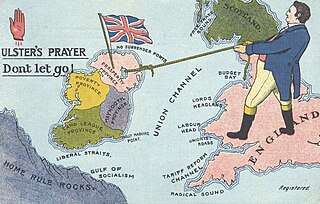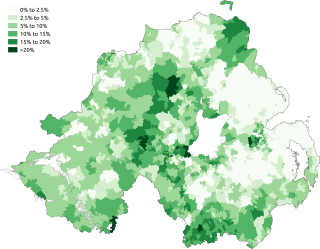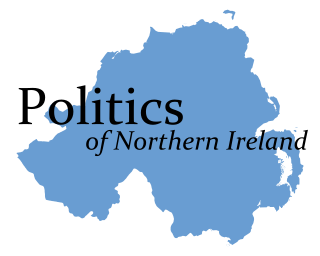
County Antrim is one of six counties that form Northern Ireland. Adjoined to the north-east shore of Lough Neagh, the county covers an area of 3,046 square kilometres (1,176 sq mi) and has a population of about 618,000. County Antrim has a population density of 203 people per square kilometre or 526 people per square mile. It is also one of the thirty-two traditional counties of Ireland, as well as part of the historic province of Ulster.

Ulster Scots or Ulster-Scots, also known as Ulster Scotch, Scots-Irish and Ullans, is the language of the Scots spoken in parts of Ulster in Ireland. It is generally considered a dialect or group of dialects of Scots, although groups such as the Ulster-Scots Language Society and Ulster-Scots Academy consider it a language in its own right, and the Ulster-Scots Agency and former Department of Culture, Arts and Leisure have used the term Ulster-Scots language.

BBC Northern Ireland is a division of the BBC and the main public broadcaster in Northern Ireland.

Unionism in Ireland is a political tradition on the island that professes loyalty to the unifying Crown and constitution of the United Kingdom. The overwhelming sentiment of a once ascendant minority Protestant population, in the decades following Catholic Emancipation (1829) it mobilised to oppose the restoration of an Irish parliament. As "Ulster unionism", in the century since Partition (1921), its commitment has been to the retention within the United Kingdom of the six Ulster counties that constitute Northern Ireland. Within the framework of a peace settlement for Northern Ireland, since 1998 unionists have reconciled to sharing office with Irish nationalists in a devolved administration, while continuing to rely on the connection with Great Britain to secure their cultural and economic interests.

The Irish language is a recognised minority language in Northern Ireland. The dialect spoken there is known as Ulster Irish. Protection for the Irish language in Northern Ireland stems largely from the European Charter for Regional or Minority Languages.

The Northern Ireland Executive is the devolved government of Northern Ireland, an administrative branch of the legislature – the Northern Ireland Assembly. It is answerable to the assembly and was initially established according to the terms of the Northern Ireland Act 1998, which followed the Good Friday Agreement. The executive is referred to in the legislation as the Executive Committee of the assembly and is an example of consociationalist ("power-sharing") government.
The Ulster Scots, also called Ulster Scots people or Scotch-Irish (Scotch-Airisch), are an ethnic group in Ireland, found mostly in the province of Ulster and to a lesser extent in the rest of Ireland. Their ancestors were mostly Protestant Presbyterian Lowland Scottish colonists, the largest numbers coming from Galloway, Lanarkshire, Renfrewshire, Ayrshire and the Scottish Borders including nearby parts of Northern England, with others coming from further north in the Scottish Lowlands and, to a much lesser extent, from the Highlands.

The Plantation of Ulster was the organised colonisation (plantation) of Ulster – a province of Ireland – by people from Great Britain during the reign of King James VI of Scotland and I of England. Most of the settlers came from southern Scotland and northern England; their culture differed from that of the native Irish. Small privately-funded plantations by wealthy landowners began in 1606, while the official plantation began in 1609. Most of the land colonised was forfeited from the native Gaelic chiefs, several of whom had fled Ireland for mainland Europe in 1607 following the Nine Years' War against English rule. The official plantation comprised an estimated half a million acres (2,000 km²) of arable land in counties Armagh, Cavan, Fermanagh, Tyrone, Tyrconnell and Londonderry. Land in counties Antrim, Down and Monaghan was privately colonised with the king's support.

The Culture of Northern Ireland relates to the traditions of Northern Ireland. Elements of the Culture of Ulster and the Culture of the United Kingdom are to be found.

Ulster English is the variety of English spoken in most of the Irish province of Ulster and throughout Northern Ireland. The dialect has been influenced by the Ulster Irish and Scots languages, the latter of which was brought over by Scottish settlers during the Plantation of Ulster and subsequent settlements throughout the 17th and 18th centuries.
The Ulster-Scots Agency is a cross-border body for Ireland which seeks to "promote the study, conservation and development of Ulster-Scots as a living language, to encourage and develop the full range of its attendant culture, and to promote an understanding of the history of the Ulster-Scots [people]."
William Crawley is a Belfast-born BBC journalist and broadcaster. He is the presenter of Talkback, a daily radio phone-in show on BBC Radio Ulster, and he is a presenter of Sunday on BBC Radio 4. He has also made several television series for BBC Northern Ireland.
Marcas Ó Murchú is an Irish woodwind flute player from Belfast, Northern Ireland. In 1997 his album Ó Bhéal go Béal was released and in 2013, he became the "Chief Bard of Irish Music".

Margaret Mary Ritchie, Baroness Ritchie of Downpatrick, is an Irish politician who was the Leader of the Social Democratic and Labour Party (SDLP) from 2010 to 2011. She was previously the Minister for Social Development in the Northern Ireland Executive from 2007 to 2010, when she was elected as the Member of Parliament (MP) for South Down.
A Kist o Wurds is a BBC Northern Ireland Ulster-Scots radio programme that has been running since 2002. The show is produced by Chris Spurr, for Blackthorn Productions. Each week it contains a selection of music, poetry and news from across the country and is a source of information on the Ulster-Scots language, culture, literary traditions and history. Broadcast on BBC Radio Ulster on Sundays at 4pm and repeated on Wednesdays at 7.30pm on Radio Ulster and Radio Foyle.
Robin's Readings is a six-part radio series adapted from 'Robin's Readings' - a collection of humorous stories written in the 19th century by County Down author, Wesley Guard Lyttle. The stories recount the adventures and mishaps of Paddy McQuillan, a cheerful but unfortunate County Down farmer - and they are written in the authentic Ulster-Scots language which was spoken throughout the Ards Peninsula.

That part of the United Kingdom called Northern Ireland was created in 1922, with the partition of the island of Ireland. The majority of the population of Northern Ireland wanted to remain within the United Kingdom. Most of these were the Protestant descendants of colonists from Great Britain.

Since 1998, Northern Ireland has devolved government within the United Kingdom. The government and Parliament of the United Kingdom are responsible for reserved and excepted matters. Reserved matters are a list of policy areas, which the Westminster Parliament may devolve to the Northern Ireland Assembly at some time in future. Excepted matters are never expected to be considered for devolution. On all other matters, the Northern Ireland Executive together with the 90-member Northern Ireland Assembly may legislate and govern for Northern Ireland. Additionally, devolution in Northern Ireland is dependent upon participation by members of the Northern Ireland Executive in the North/South Ministerial Council, which co-ordinates areas of co-operation between Northern Ireland and the Republic of Ireland.
Ulster Protestants are an ethnoreligious group in the Irish province of Ulster, where they make up about 43% of the population. Many Ulster Protestants are descendants of settlers who arrived in the early 17th century Ulster Plantation. This was the colonisation of the Gaelic, Catholic province of Ulster by English-speaking Protestants from Great Britain, mostly from the Scottish Lowlands and Northern England. Many more Scottish Protestant migrants arrived in Ulster in the late 17th century. Those who came from Scotland were mostly Presbyterians, while those from England were mostly Anglicans. There is also a small Methodist community and the Methodist Church in Ireland dates to John Wesley's first visit to Ulster in 1752. Although most Ulster Protestants descend from Lowland Scots and English, some also descend from Irish, Welsh and Huguenots.

The 2017 election to the Northern Ireland Assembly was held on 2 March 2017. The election was held to elect members (MLAs) following the resignation of deputy First Minister Martin McGuinness in protest over the Renewable Heat Incentive scandal. McGuinness' position was not filled, and thus by law his resignation triggered an election. It was the sixth election since the Assembly was re-established in 1998, and the first to implement a reduction in size to 90 MLAs.










